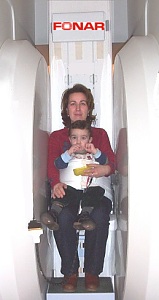
|
|
||||||||||||||
FONAR Wins The Wall Street Journal
Technology Innovation Award For 2007
For the FONAR UPRIGHT™ Multi-Position™ MRI MELVILLE, NEW YORK, September 26, 2007 - FONAR Corporation (NASDAQ-FONR), The Inventor of MR Scanning™, reported today that The Wall Street Journal announced in Monday's edition (9/24/2007) that out of over 800 contenders FONAR has been named one of two runners-up for The Wall Street Journal Technology Innovation Award for 2007. The award is for the FONAR UPRIGHT™ Multi-Position™ MRI.
The news editor of the Journal congratulated FONAR president and founder Raymond V. Damadian, MD, in an email that stated: "We are pleased to inform you that FONAR is a runner-up in the Medical-Devices category of this year's Wall Street Journal Technology Innovation Awards. You should be very proud of this achievement. We received more than 800 entries, with only about 4% receiving an award. Needless to say, the competition was extremely intense. Full coverage of the awards appears in The Wall Street Journal's three global editions on Monday as well as for online subscribers at http://online.wsj.com/page/2_1323.html." Dr.
Damadian was also invited to an awards ceremony and dinner on
October 24 in Redwood City,
California, at the Sofitel San Francisco Bay Hotel. More about The Wall Street Journal Technology Innovation
Awards Factors the panel considered included: - It needed to address major challenges for which new solutions would have a wide-ranging impact in a particular industry. - The written application needed to be supported by rigorous data rather than unsubstantiated claims of potential. About FONAR FONAR has the most accomplished history of any company in MRI. The company's heritage helps to document the quality of its products and distinguishes it from all other MRI companies. A timeline of its achievements follows. It includes the groundbreaking discovery of the principle that makes MRI imaging possible, the patent for the first MRI, and the sale of the world's first MRI. 1969 - Original Idea for MR Scanner (Grant Application to Health Research Council of the City of New York)* 1969 - Realizes Need for a Compelling Application to Justify Building Human Scanner. Decides on Cancer Detection 1970 - Key Discovery Makes the MRI Possible Discovery of the marked T1 and T2 signal differences among the normal tissues and also between the normal tissue and cancer tissue. Discovery enables soft-tissue detail previously absent from medical imaging, and early cancer detection; used today to detect cancers worldwide. "NMR developed into a laboratory spectroscopic technique capable of examining the molecular structure of compounds, until Damadian's ground-breaking discovery in 1971." MRI From Picture to Proton, Cambridge University Press, 2003) March 1971 - First Article Published (Science) Spring 1971 - First Ever Method Proposed (Downstate Reporter) March 1972 - First MR Patent Filed (3D Serial Voxel Scanning Method). Patent Issued 1974. 1976 - The Struggle Begins. Expert Declares, "Any further discussion of scanning the human body by MR (NMR) is visionary nonsense." 1976 - Construction of First Human MR Scanner Commences 1977 - Construction Completed; First Human Scan Achieved: Thoracic Image at T-8 1980 - FONAR Installs First Commercial MRI; Initiates MRI Industry 1997 - Patent Upheld by High Court on U. S. Patents and the U. S. Supreme Court. (1.1 Million Pages of Documentary Evidence Scrutinized and Argued; No Prior Art) 2001 - Introduction of the FONAR UPRIGHT™ Multi-Position™ MRI 2007 - National Inventor of the Year Award for the UPRIGHT™ Multi-Position™ MRI. * For documents visit www.fonar.com/fonar_timeline.htm More about the FONAR UPRIGHT™ Multi-Position™ MRI. The FONAR UPRIGHT™ Multi-Position™ MRI is a dramatic advance over all other MRI's, which can only scan the patient in a recumbent-only, non-weight-bearing position. The UPRIGHT™ allows the patient to be imaged upright, with the weight of the body on the spine. Most patients are scanned sitting, while they enjoy watching TV. Patients can also be scanned in flexion, extension, rotation, as well as lying down. This positional imaging allows surgeons and radiologists to see patients in the position of their symptoms. Studies and physician experience show that diagnosis using the FONAR UPRIGHT™ changes surgical protocols and provides better surgical outcomes in approximately 20% of the cases. The FONAR UPRIGHT™ Multi-Position™ MRI is also unrivaled in patient comfort. It has a near zero claustrophobic rejection rate by patients. It can scan obese patients who cannot fit into a recumbent MRI, and it allows imaging of children while they sit in their mother's lap. Over a half million patients have been scanned by the FONAR UPRIGHT™ MRI. To date, 152 UPRIGHT™ MRIs have been sold. The superiority of the technology is achieving wider recognition every day. Another New FONAR MRI: The FONAR 360™ FONAR has invented another breakthrough MRI, the FONAR 360™. It's a room-size recumbent scanner that optimizes openness while facilitating physician access to the patient during surgery. FONAR is headquartered on Long Island, New York, and has approximately 400 employees. # This release may include
forward-looking statements from the company that may or may not
materialize. Additional information on factors that could potentially
affect the company's financial results may be found in the company's
filings with the Securities and Exchange Commission. FONAR™ Corporation Copyright © 2007 FONAR- All Rights Reserved |
